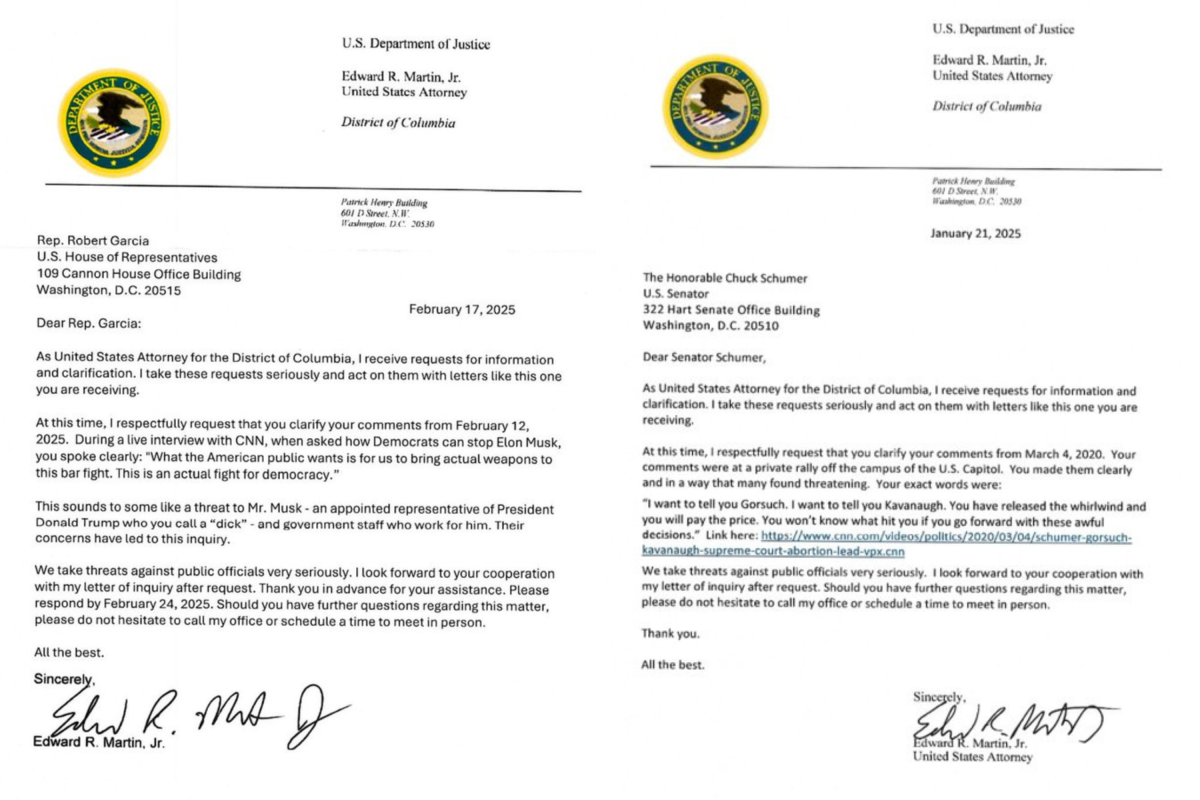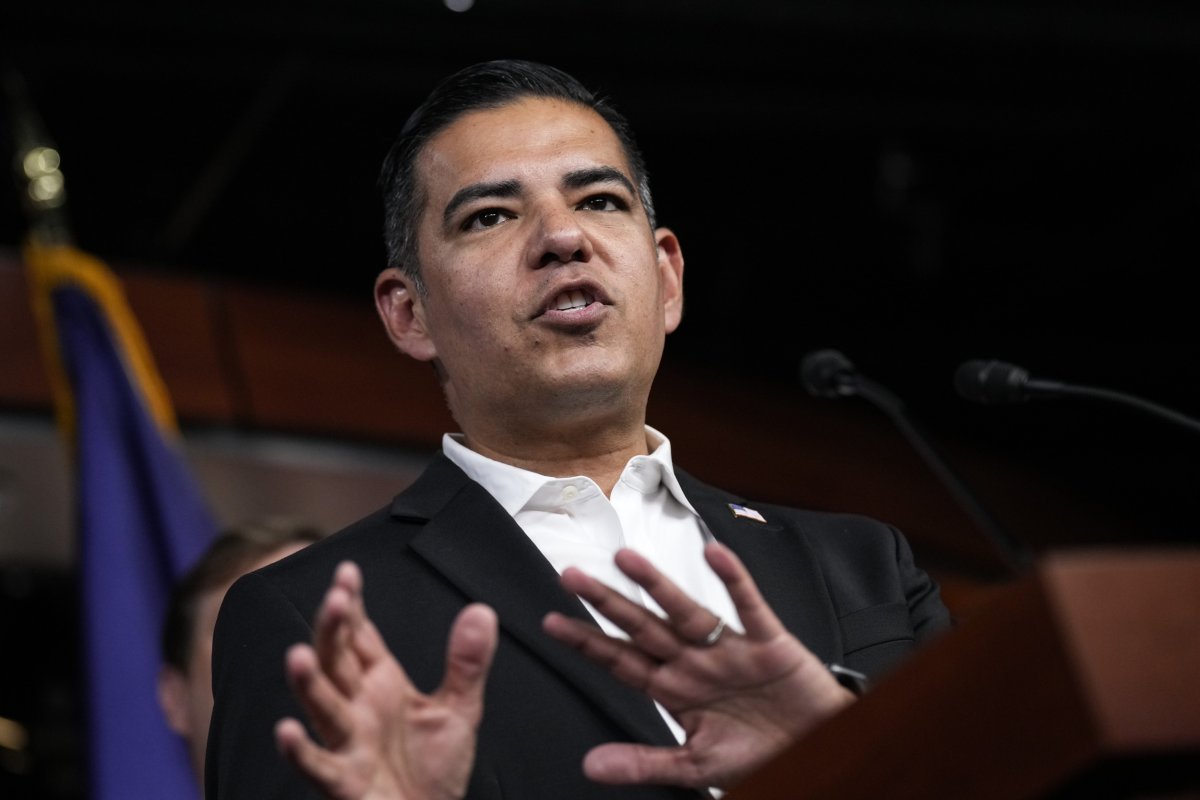Robert Garcia's DOJ Letter: Latest News & Developments
Is free speech being stifled, or is accountability finally catching up? The recent exchange between Representative Robert Garcia and the Department of Justice suggests a chilling effect on political discourse, raising serious questions about the boundaries of criticism and the potential for intimidation.
The crux of the matter lies in a letter sent by the U.S. Department of Justice (DOJ) to Congressman Robert Garcia. Dated February 17th, the letter, shared by Garcia on Thursday, initiated a sequence of events that has ignited a firestorm of debate. The letter, originating from interim U.S. Attorney Edward Martin, representing the District of Columbia, expresses concerns regarding comments made by Garcia, particularly those aimed at Elon Musk, the billionaire entrepreneur.
The genesis of the DOJ's concern appears to stem from an interview Garcia gave on CNN, where he addressed the strategies Democrats might employ to counter Musk's influence. During this exchange, Garcia, when asked about how Democrats can stop Elon Musk, was quoted saying, "what the American public wants is for us to bring actual weapons to this bar fight." This metaphorical language, comparing the political arena to a physical confrontation, drew sharp scrutiny from the DOJ. Martin's letter insinuated that Garcia's remarks could be interpreted as a threat, prompting a demand for clarification. The implication is clear: the DOJ believes Garcia's words crossed a line, potentially veering into the realm of incitement or intimidation.
The situation escalated when Garcia, refusing to be silenced, responded to the DOJ's inquiry with defiance. He characterized Musk in blunt terms, using the derogatory term "dick" and highlighting Musk's perceived association with the Trump administration. This public rebuke, coupled with Garcia's assertion that he would not be cowed, signals a willingness to confront the perceived overreach of the DOJ. It underscores the Congressmans view that he is being unfairly targeted for expressing his political opinions. This stance also challenges the DOJ to explicitly define where protected speech ends and potential threats begin.
The letter from the DOJ wasn't the first such instance. Previous communications from Martin, specifically concerning Garcia's comments on Musk, were also mentioned. The context surrounding these exchanges further fuels the controversy. Garcia has been a vocal critic of Musk, particularly regarding the billionaire's takeover of Twitter, now known as X. The congressman's concerns have centered on the potential impact of Musk's actions on free speech and the spread of misinformation.
The timing of the DOJ's scrutiny is also significant. It is a matter of public record that Edward Martin is an interim U.S. Attorney, making his actions potentially influenced by the administration that appointed him. The situation is further complicated by the fact that the letter was sent on Monday, and shared by Garcia on Thursday. This suggests a potentially hurried response by the DOJ, perhaps aimed at silencing criticism from the Congressman.
The case has sparked a wider debate about the chilling effect that such actions can have on political discourse. Critics argue that the DOJ's intervention is an attempt to intimidate a dissenting voice, thereby stifling robust debate and discouraging others from speaking out against powerful figures. Some legal experts are weighing in on the implications of the DOJ's actions, with several discussing the line between protected speech and threats. There is the potential for the DOJ's actions to be seen as a political attack, which would be dangerous for the integrity of the Justice Department.
Adding to the complexity of the situation is the fact that this isn't an isolated incident. Similar letters from the DOJ have been sent to Garcia in the past, indicating a pattern of inquiry into his statements on Elon Musk. This recurrence raises questions about whether Garcia is being singled out for his outspoken criticism or if these inquiries are based on genuine concerns about the nature of his remarks.
The fact that the DOJ is taking such an action shows the power of wealthy businessmen. The DOJ's actions send a message about the power that wealthy, connected individuals can exert, and whether or not the DOJ is biased in their pursuit of justice. It will be interesting to see how this situation plays out, and what precedents it might set for future cases.
The case of Robert Garcia and the DOJ's intervention raises several critical questions. The most important is whether the DOJ is overstepping its bounds in its pursuit of clarification of speech, or whether the speech was so harmful that an investigation was warranted. A second question is whether this represents a broader trend of political intimidation, or if this is a one-off incident. Finally, the case offers the public the opportunity to learn more about how government agencies operate and what their true mandates are.
| Attribute | Details |
|---|---|
| Full Name | Robert Garcia |
| Date of Birth | June 1, 1977 |
| Place of Birth | Lima, Peru |
| Citizenship | American |
| Education | University of Southern California (Communications, B.A.) |
| Political Affiliation | Democratic Party |
| Current Position | U.S. Representative for California's 42nd congressional district |
| Previous Positions | Mayor of Long Beach, California (2014-2022) |
| Key Issues/Legislative Focus | Climate change, infrastructure, affordable housing, and social justice. |
| Significant Legislation | Has been involved in the passage of legislation relating to climate change and infrastructure, and has been a proponent of policies aimed at increasing affordable housing and promoting social justice. |
| Controversies | Facing scrutiny over his comments about Elon Musk, and over his criticism of the Trump administration |
| Public Statements | Frequently makes statements on social media and in interviews related to political issues, including criticism of Elon Musk and the Trump administration |
| Official Website | https://garcia.house.gov/ |
Robert Garcia's response to the DOJ's letter, and his ongoing criticism of Elon Musk, reveal a clash of ideologies and power. Garcia's defense of free speech and his willingness to challenge the powerful figures and institutions is a bold move. The DOJ's response will likely be seen as both a challenge and a test for free speech in the United States.



